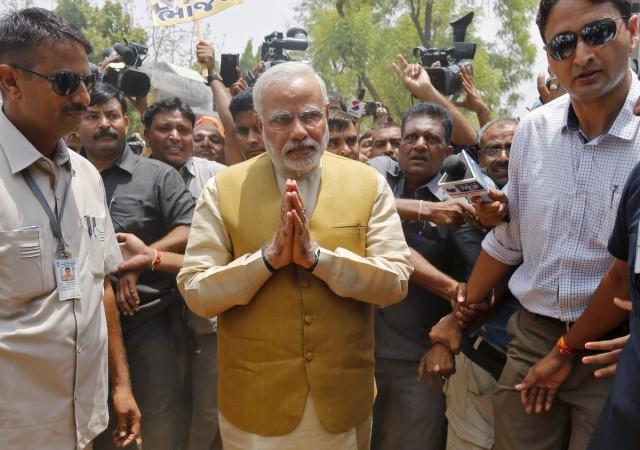
Opposition candidate Narendra Modi will be the next prime minister of India, with counting trends showing the pro-business Hindu nationalist and his party headed for the most resounding election victory the country has seen in thirty years.
Modi's landslide win was welcomed with a thundering rally on India's stock markets and jubilant celebrations at offices across the country of his Bharatiya Janata Party (BJP), where supporters danced, exploded fireworks and handed out sweets.
"Trends indicate it is a landslide," said party president Rajnath Singh in a message on Twitter.
The alliance led by the BJP, and possibly the party alone, was headed for a majority in parliament, giving Modi the most decisive mandate for any leader since the 1984 assassination of prime minister Indira Gandhi propelled her son to office.
Unlike his predecessors, Modi will not have to deal with unruly coalition partners as he implements reform. That could usher in profound economic changes, and he will try to replicate his success in attracting investment and building infrastructure in Gujarat, the state he has governed for 12 years.
"He can afford to have a smaller but stronger cabinet, that means a far more decisive government. He has been saying less government and more governance, we are really likely to see that," said Navneet Munot, Chief Investment Officer at SBI Funds management in Mumbai.
But with India's economy suffering its worst slowdown since the 1980s and battling high inflation, it will not be an easy task to meet the hopes of millions of Indians who have bought into the idea that Modi will quickly push their country onto the top table of global economic powers. "People will not give him much time to deliver," said Neerja Chowdhury, a political analyst and a former political editor of the Indian Express newspaper.
"On the economic reform agenda, I think he will move very quickly ... he's a doer and he's very focused."
DESIRE FOR CHANGE
The 63-year-old's promises of job creation and clean, efficient government resonated with many of the half a billion people who braved blistering summer heat to vote in the world's biggest election over the last five weeks.
Since being named as his party's candidate last September, Modi has flown 300,000 km and addressed 457 rallies in a slick, presidential-style campaign that has broken the mould of Indian politics.
Modi's media-savvy, modern campaign ran circles round his slow-footed rival, Rahul Gandhi, 43, from the Congress party. The Congress, which led India to independence from Britain, was headed for its worst-ever result after two terms in office marred by corruption and a floundering economy. Prime Minister Manmohan Singh, who as finance minister launched reforms in 1991 that brought an end to decades of economic isolation, has already bid farewell to his staff after ten years in office marked by mounting policy paralysis.
The desire for change has been so strong that voters put aside concerns about Modi's Hindu-centric politics. A dark chapter of violence against Muslims on his watch has mattered less and less to many, including a bulging middle class alarmed by dwindling purchasing power and job opportunities as the economy slumped to sub-five percent growth in the last two years.
Gandhi was leading by a slender margin in his seat of Amethi, a family bastion that has been held in turn by his uncle, father and mother, Sonia. A loss there would spell disaster for the great grandson of India's independence leader.
The alliance led by the BJP was winning in 332 seats of the 543-seat parliament, counting trends showed. The BJP alone looked set for an absolute majority, with 278 seats.
Responding to the news, markets got off to a roaring start, with the rupee INR=D2breaking below 59 to the U.S. dollar, an 11-month high, and the Sensex jumped 6 percent before paring its gains.
Betting on a Modi win, foreign investors have poured more than $16 billion into Indian stocks and bonds in the past six months and now hold over 22 percent of Mumbai-listed equities - a stake estimated by Morgan Stanley at almost $280 billion.
"MODINOMICS"
Modi has promised that, if elected, he would take decisive action to unblock stalled investments in power, road and rail projects to revive economic growth.
Tax and labour market reforms, backed by a gradual opening up to foreign investment, would seek to create the 10 million jobs that Asia's third-largest economy must create every year to employ young people entering the workforce.
Modi watched the results on TV at his home in Gujarat, and was due to meet his mother, 95-year-old Hiraben, soon after results become clear. "My blessings are there. The country will develop. My blessings are there," she said.
He was later expected to embark on a victory tour to his local constituency of Vadodara, while party workers in New Delhi hoped he would later fly to New Delhi for what could be a hero's welcome.

















